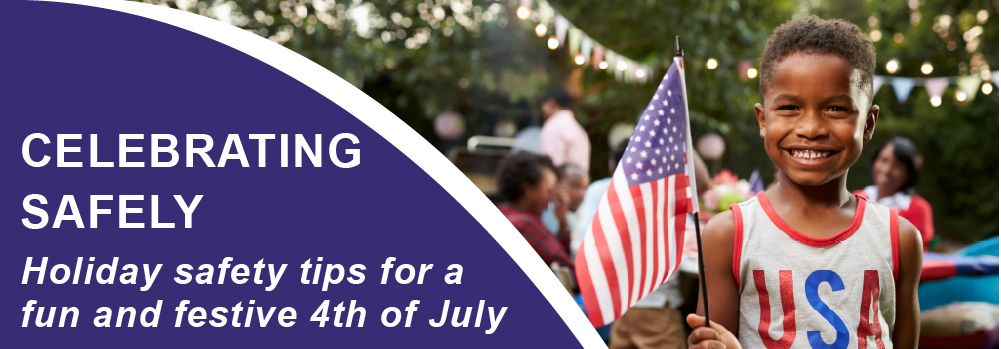
Holiday safety tips for a fun and festive 4th of July
This Fourth of July, more than ever, we are looking forward to celebrating with family and friends. Although some of the restrictions around COVID-19 have been relaxed, there are some other health concerns to consider. Follow these safety reminders to keep yourself and your family safe this holiday weekend.
Firework Safety
Fireworks are a favorite tradition and for the Fourth of July, but they can cause death and injury, including burns, cuts, bruises, and foreign objects in your eyes.
- Never allow young children to play with or ignite fireworks.
- Always have an adult supervise fireworks activities.
- Designate the people who will be responsible for igniting fireworks.
- Avoid buying fireworks packaged in brown paper, which often means they were made for professional displays and could be dangerous for consumers.
- Make sure you and your family watch fireworks displays from a safe distance. Draw a line using chalk or string, so children have a visual indicator not to cross and get too close to where the fireworks are being launched.
- Call 911 immediately if someone is injured from fireworks.
Food Safety
Hot weather and food that’s been left out a little too long are a recipe for a stomachache. According to the Centers for Disease Control and Prevention (CDC), the summer months typically see a spike in reports of foodborne illness. Whether hosting or attending a 4th of July picnic or BBQ, follow these tips to ensure you and your family
- Use separate plates and utensils for raw and cooked meat and poultry and ready to eat foods, like raw fruits and vegetables.
- Use a food thermometer to make sure meat and poultry are cooked hot enough to kill harmful germs.
- Don’t leave food at room temperature for longer than two hours – one hour if the outside temperature is over 90 degrees. Keep perishable food in an insulated cooler packed with ice or ice packs. If you are not the host or hostess and are unsure about how food is being handled, consider bringing your own cooler of food.
Pool Safety
According to the CDC, drowning is responsible for more deaths among children 1 to 4 years old than any other cause except birth defects.
- Designate a responsible adult to watch all children swimming or playing in or around water. Drowning occurs quickly and quietly, so adults should not be involved in any other distracting activity while supervising children. If there are multiple children swimming, have multiple adults to supervise, each assigned to monitor specific children.
- Teach kids to swim. Formal swimming lessons can protect young children from drowning.
- Always swim with a buddy. Whenever possible choose swimming sites that have lifeguards.
- Avoid drinking alcohol before or during swimming, boating, or water skiing. Do not drink alcohol while supervising children.
- Know the local weather conditions and forecast before swimming or boating. Strong winds and thunderstorms with lightning strikes are dangerous.
Heat Safety
From parades to fireworks, the Fourth of July typically means a lot of time outdoors and in the sun. In hot temperatures your body may be unable to properly cool itself. This could lead to serious health problems.
- Drink plenty of fluids, regardless of your activity level. Don’t wait until you’re thirsty to drink. Warning: If your doctor generally limits the amount of fluid you drink or has you on water pills, ask how much you should drink while the weather is hot.
- Don’t drink liquids that contain alcohol or large amounts of sugar–these actually cause you to lose more body fluid. Also, avoid very cold drinks, because they can cause stomach cramps.
- Stay in the shade when you can, and when you can’t, create your own shade. Protect yourself from the sun by wearing a wide-brimmed hat and sunglasses. Wear lightweight, light-colored, loose-fitting clothing.
- Put on sunscreen of SPF 15 or higher – the most effective products say “broad spectrum” or “UVA/UVB protection” on their labels.
Bug Safety
Uninvited party guests like mosquitoes, ticks, and some flies can spread diseases like Zika, dengue and Lyme disease. They’re also really annoying and their bites can cause pain, itching and in some cases, an allergic reaction.
- Use EPA-registered insect repellents that contain at least 20% DEET for protection against mosquitoes, ticks, and other bugs. Remember always follow product instructions. Do not use products containing OLE or PMD on children under 3 years old.
- If possible, wear long-sleeved shirts, long pants, socks, and a hat. Tuck your shirt into your pants and tuck your pants into your socks for maximum protection, especially if walking in a grassy area.
- Check yourself and your children for ticks. Learn more about ticks and how to remove one from your skin: blog.ihacares.com/tick-tick-boom/
Despite taking precautions, illness and injury can still happen. IHA and St. Joe’s Medical Group Urgent Care locations will be open this holiday weekend to care for you and your family. Click below to save your spot in line at an urgent care near you.
